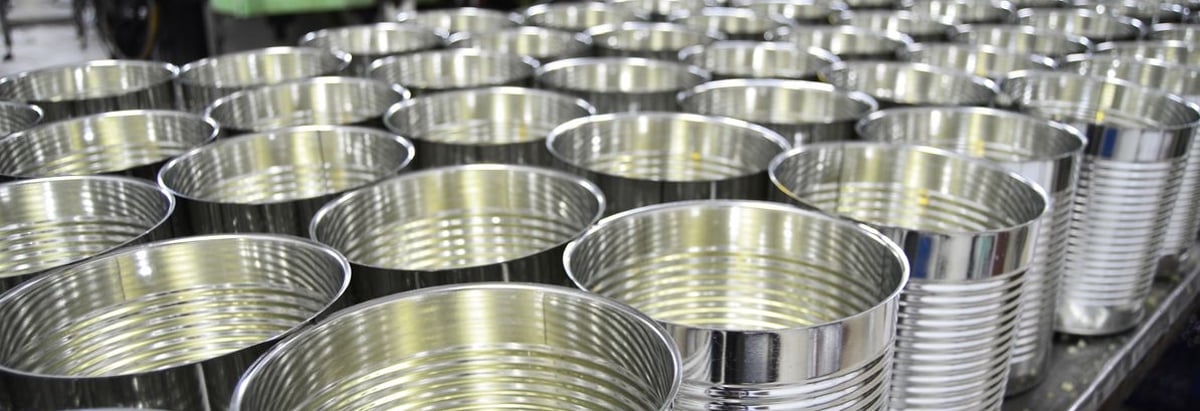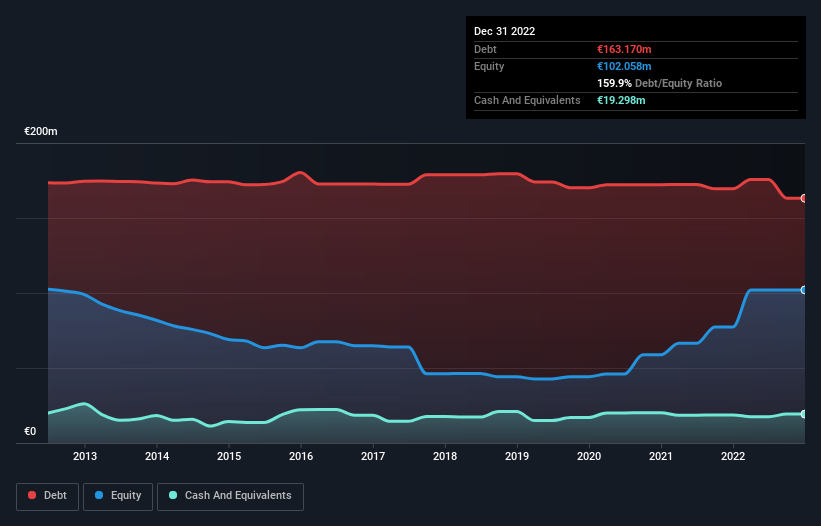- Greece
- /
- Metals and Mining
- /
- ATSE:ALMY
Does Alumil Aluminium Industry (ATH:ALMY) Have A Healthy Balance Sheet?

Some say volatility, rather than debt, is the best way to think about risk as an investor, but Warren Buffett famously said that 'Volatility is far from synonymous with risk.' It's only natural to consider a company's balance sheet when you examine how risky it is, since debt is often involved when a business collapses. Importantly, Alumil Aluminium Industry S.A. (ATH:ALMY) does carry debt. But should shareholders be worried about its use of debt?
When Is Debt Dangerous?
Generally speaking, debt only becomes a real problem when a company can't easily pay it off, either by raising capital or with its own cash flow. Part and parcel of capitalism is the process of 'creative destruction' where failed businesses are mercilessly liquidated by their bankers. However, a more common (but still painful) scenario is that it has to raise new equity capital at a low price, thus permanently diluting shareholders. Of course, debt can be an important tool in businesses, particularly capital heavy businesses. The first step when considering a company's debt levels is to consider its cash and debt together.
View our latest analysis for Alumil Aluminium Industry
What Is Alumil Aluminium Industry's Net Debt?
The chart below, which you can click on for greater detail, shows that Alumil Aluminium Industry had €163.2m in debt in December 2022; about the same as the year before. On the flip side, it has €19.3m in cash leading to net debt of about €143.9m.

A Look At Alumil Aluminium Industry's Liabilities
Zooming in on the latest balance sheet data, we can see that Alumil Aluminium Industry had liabilities of €100.3m due within 12 months and liabilities of €158.7m due beyond that. Offsetting this, it had €19.3m in cash and €74.2m in receivables that were due within 12 months. So it has liabilities totalling €165.5m more than its cash and near-term receivables, combined.
The deficiency here weighs heavily on the €84.0m company itself, as if a child were struggling under the weight of an enormous back-pack full of books, his sports gear, and a trumpet. So we definitely think shareholders need to watch this one closely. At the end of the day, Alumil Aluminium Industry would probably need a major re-capitalization if its creditors were to demand repayment.
We use two main ratios to inform us about debt levels relative to earnings. The first is net debt divided by earnings before interest, tax, depreciation, and amortization (EBITDA), while the second is how many times its earnings before interest and tax (EBIT) covers its interest expense (or its interest cover, for short). The advantage of this approach is that we take into account both the absolute quantum of debt (with net debt to EBITDA) and the actual interest expenses associated with that debt (with its interest cover ratio).
Alumil Aluminium Industry's debt is 2.6 times its EBITDA, and its EBIT cover its interest expense 5.9 times over. Taken together this implies that, while we wouldn't want to see debt levels rise, we think it can handle its current leverage. Importantly, Alumil Aluminium Industry grew its EBIT by 43% over the last twelve months, and that growth will make it easier to handle its debt. There's no doubt that we learn most about debt from the balance sheet. But you can't view debt in total isolation; since Alumil Aluminium Industry will need earnings to service that debt. So when considering debt, it's definitely worth looking at the earnings trend. Click here for an interactive snapshot.
Finally, while the tax-man may adore accounting profits, lenders only accept cold hard cash. So the logical step is to look at the proportion of that EBIT that is matched by actual free cash flow. In the last three years, Alumil Aluminium Industry's free cash flow amounted to 21% of its EBIT, less than we'd expect. That's not great, when it comes to paying down debt.
Our View
Mulling over Alumil Aluminium Industry's attempt at staying on top of its total liabilities, we're certainly not enthusiastic. But on the bright side, its EBIT growth rate is a good sign, and makes us more optimistic. Once we consider all the factors above, together, it seems to us that Alumil Aluminium Industry's debt is making it a bit risky. That's not necessarily a bad thing, but we'd generally feel more comfortable with less leverage. There's no doubt that we learn most about debt from the balance sheet. But ultimately, every company can contain risks that exist outside of the balance sheet. Case in point: We've spotted 3 warning signs for Alumil Aluminium Industry you should be aware of, and 1 of them is potentially serious.
Of course, if you're the type of investor who prefers buying stocks without the burden of debt, then don't hesitate to discover our exclusive list of net cash growth stocks, today.
New: Manage All Your Stock Portfolios in One Place
We've created the ultimate portfolio companion for stock investors, and it's free.
• Connect an unlimited number of Portfolios and see your total in one currency
• Be alerted to new Warning Signs or Risks via email or mobile
• Track the Fair Value of your stocks
Have feedback on this article? Concerned about the content? Get in touch with us directly. Alternatively, email editorial-team (at) simplywallst.com.
This article by Simply Wall St is general in nature. We provide commentary based on historical data and analyst forecasts only using an unbiased methodology and our articles are not intended to be financial advice. It does not constitute a recommendation to buy or sell any stock, and does not take account of your objectives, or your financial situation. We aim to bring you long-term focused analysis driven by fundamental data. Note that our analysis may not factor in the latest price-sensitive company announcements or qualitative material. Simply Wall St has no position in any stocks mentioned.
About ATSE:ALMY
Alumil Aluminium Industry
Engages in the design, development, and production of aluminum architectural systems in Greece and internationally.
Solid track record with adequate balance sheet.
Market Insights
Community Narratives




